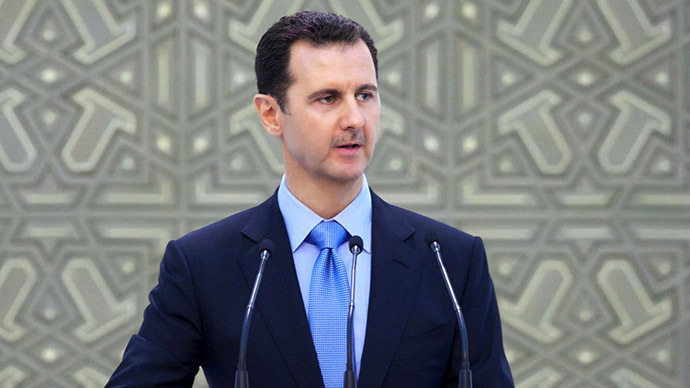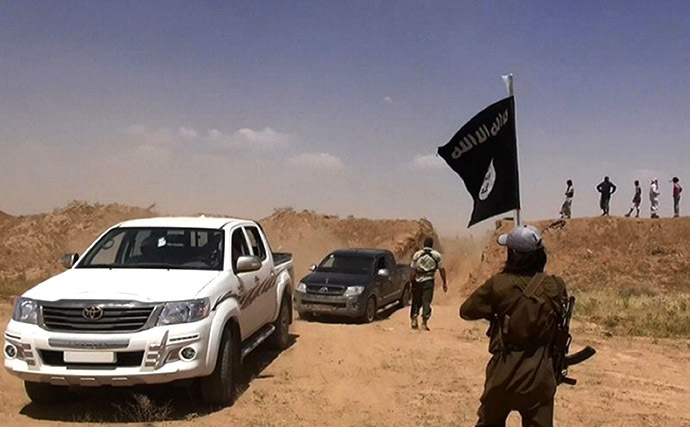‘US realizing that ISIS getting stronger is bad alternative to Assad’

If the United States is to really degrade the capability of ISIS it needs to be done not only in Iraq but also in Syria, Max Abrahms, professor at Northeastern University, told RT.
Not only does ISIS kill civilians indiscriminately but unlike Assad ISIS directly threatens the United States, Abrahms said.
RT:US Defense Secretary Chuck Hagel just said in a speech that Islamic State can only be tackled if the situation in Syria is dealt with - what do you make of that?
Max Abrahms: There is a massive contradiction in US policy against ISIS. On the one hand the US since August 8 has been militarily involved against ISIS in Iraq with 90 airstrikes providing some light weapons to the Kurds and the Iraqi federal forces. And yet the contradiction is that the majority of ISIS fighters are actually not even based in that country. They are based in Syria. And so far the United Stated has done nothing to combat the growth of ISIS in Syria. I think people are increasingly realizing that this is an unsustainable policy. ISIS has gotten stronger and stronger. Particularly over the past two months. And there is senses that the local actors, vigilante groups, other militant groups, the Iraqi government, even the Kurds are unable to halt this movement by ISIS without US intervention. So far we have seen it in Iraq; I expect to see it in Syria as well.
RT:Hagel also said Assad is clearly a part of the problem regarding the rise of the Islamic State. Is he right?
MA: There is plenty of blame to go around. I think Maliki was part of the problem in Iraq. I think Assad is part of the problem in Syria. I mean basically what happened is that Assad and ISIS have not really been engaging much in direct conflict, in direct military operations. That has changed a bit over the past couple of weeks. But in general I think that Assad has allowed ISIS to do what it wants. And it has fought mostly not against the regime’s forces but against other militants going into unconsolidated areas cleaning house, annexing these territories, gathering more and more strength. And so in that sense there has been a sort of a tacit understanding between Assad and ISIS. But at this point I do believe that the gloves are coming off.

I do think that Assad has been part of the problem. There is basically been a tacit arrangement between Assad and ISIS over the past couple of years where it was basically understood that they would not actually battle each other that much in confrontations. So ISIS has been doing a lot of fighting but this fighting hasn`t been directed against the regime so much as it has been directed against rival organizations. But the tide is turning. Over the past couple of weeks there have been more direct confrontations, with Assad using the air force effectively I think to rain down some pain against ISIS. There is a realization in Washington DC that ISIS needs to be stopped and that it is only getting stronger. And Assad recognizes that if his regime doesn`t do something it faces a very real possibility of being overturned by these jihadists. So I expect that campaign, that military dynamic between Assad and ISIS to continue to heat up just as the situation is heating up in Iraq at the same time.
RT:Does the Islamic State pose a real threat to nations other than Syria and Iraq?
MA: I think that for the past couple of years from the United States we have been watching ISIS gain power in Iraq and in Syria. And it seemed like perhaps ISIS was mainly a regional threat. That maybe the group really just was reprehensible in its behavior, killing of civilians, etc., the beheading. But maybe the group didn`t pose the threat to the United States. Maybe it posed the threat to Iraq, maybe to Syria, maybe to Jordan, maybe to Saudi Arabia but not so much against the West. And then I think that things really begin to change over the past couple months during the summer when ISIS, it was understood, was becoming stronger and stronger. And then the US started supporting some higher measure of military involvement in Iraq against ISIS in terms of limited airstrikes, in terms of helping out the Kurds, in terms of helping out Iraqi federal forces. And since then we have seen a bit of a watershed where now ISIS is rhetorically issuing threats against the West saying that the black flag of ISIS is going to hang over the White House that Americans wherever they may be are going to be killed. And then there is this beheading which has been broadcast all over the social media. And I think that the American public is kind of moving out of its isolationist feel, out of its stupor and realizes that something really serious has to happen because this group is not just going to go away. Quite the opposite - it is only getting stronger.
If the United States is to really degrade the capability of ISIS that needs to be done not only in Iraq but also in Syria. And I think that whereas initially Americans understood Assad in terms of his humanitarian behavior, in terms of his treatment of his own population, which is really bad, reprehensible. And so Americans said this guy is terrible. Naturally we have to be against him. Now we are seeing that actually the ISIS alternative may be even worse. Not only does ISIS kills civilians indiscriminately but unlike Assad ISIS directly threatens the United States. Assad does not issue threats about raising the Syrian flag over the White House or killing Americans wherever they may be. And I think that Americans may have to stomach up and put aside their humanitarian reservations in order to try to broker some kind of strategically alliance with this dictator because again the ISIS alternative is even more dangerous.
The statements, views and opinions expressed in this column are solely those of the author and do not necessarily represent those of RT.












